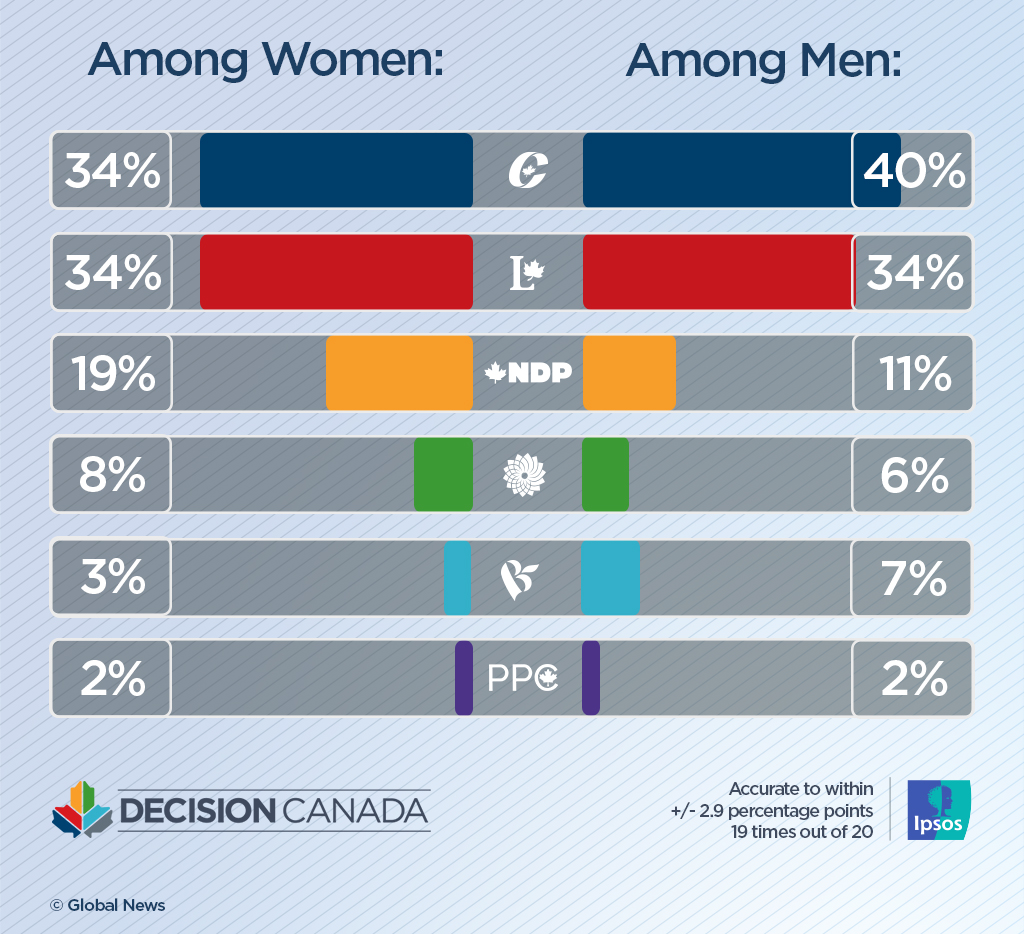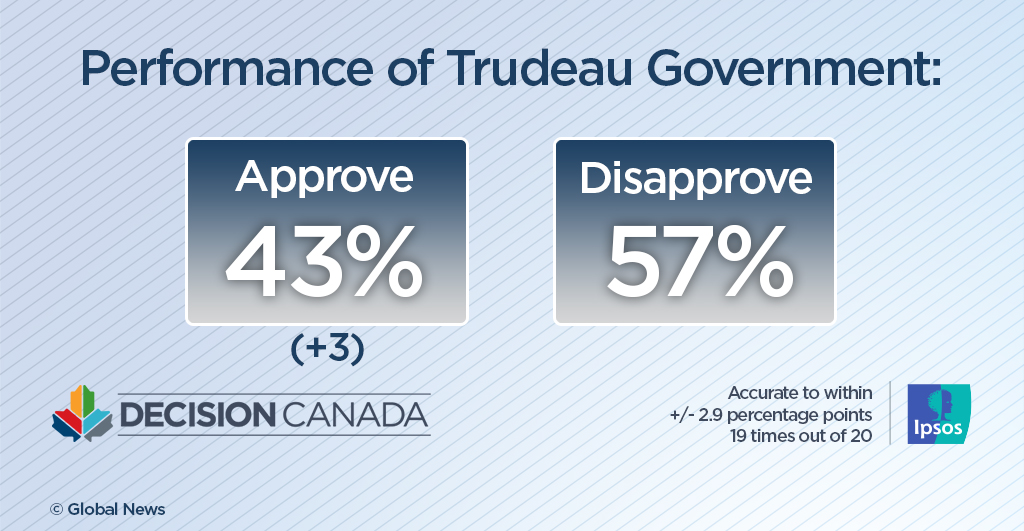As the election reaches its halfway point, the Conservatives are maintaining a slim lead over the incumbent Liberals, according to a new Ipsos poll.

The poll, conducted exclusively for Global News, shows that 37 per cent of voters surveyed would vote Conservative if an election were held tomorrow — a one-point gain since last week.
Almost two weeks after Justin Trudeau’s blackface scandal, the poll indicated that 34 per cent of decided voters would choose the Liberal Party — up two points from last week — while the NDP’s Jagmeet Singh remains at 15 per cent of the vote, same as last week.
“It’s really become a two-horse race,” said Darrell Bricker, president of Ipsos. “Consistently, the Conservatives are outpacing the Liberals.”
Bricker said he hasn’t seen an Ipsos poll in months where “we’ve actually had the Liberals ahead.”
“They’re not the front runners at the moment,” he said. “It’s a very close race obviously. But the Conservatives have consistently led the race since the beginning of the campaign.”
The small gains for both the Tories and Liberals come at the cost of the Green Party, down by four points — only 7 per cent of those surveyed said they would vote Green. The Bloc Québécois gained one point to 5 per cent, though their support in Quebec is 22 per cent (up by three points).
WATCH: Liberals, Conservatives in close race as Green support drops four points: Ipsos poll

“This has become a two-party race and it looks like it’s fairly frozen in time right now,” Bricker said.
The poll broke down support for each party by demographics, finding that the Conservatives and the Liberals are doing “equally well with women.”

Get breaking National news
The Liberals are at 34 per cent among women and among men, while the Conservatives are at 34 per cent among women and at 40 per cent among men.
- Read the transcript of Trump’s response to U.S. Supreme Court tariff ruling
- Danielle Smith promises Alberta referendum over immigration, Constitution changes
- ‘No reason to continue discussing’: Ontario mayor wants Andrew’s name dropped
- Trump’s global tariffs were struck down. Don’t expect price drops: experts
“What we’re actually seeing is that the gender gap is actually hurting the Liberal Party and that’s with men,” Bricker said.
The Liberals appear popular among those aged 18 to 34 years, with 34 per cent of millennials indicating they would vote Liberal while 25 per cent chose Conservative. The NDP also received 25 per cent of support in this age group.
But that quickly changes among older voters, particularly boomers.
Among those 55 years and older — the group most likely to vote on election day — the poll showed that the Conservatives have 42 per cent of the vote while Liberals are at 35 per cent. Among voters 35 to 54 years of age, the Conservatives polled at 42 per cent — 10 points more than the Liberals (32 per cent).
WATCH: Federal parties target voters under 35 in effort to gain advantage in election

Bricker warned that younger voters “seem less enthusiastic about this election campaign than they did back in 2015.”
He also said it’s an “extremely tight” race in key provinces such as Ontario — “where the Liberals have a slight lead” — and B.C.
“It’s a very close race across the country,” he said, with the exception of western Canada, where the Tories are in a clear lead.
WATCH: Battleground of suburban ridings in Toronto area

“British Columbia aside, if you look at the Prairies, you can paint it almost all blue on election night,” Bricker said.
The poll shows that Trudeau’s Liberals (39 per cent) only have two points over the Tories (37 per cent) — essentially making it a tie in Ontario. A similar situation appears in B.C., where the Conservatives (35 per cent) are only one point ahead of the Liberals (34 per cent).
The incumbent party (35 per cent) is also seeing a smaller though still double-digit lead over other parties in Quebec, where the Tories are at 24 per cent, the Bloc at 22 per cent, and the NDP at 11 per cent.
The poll shows that the Conservatives are at 60 per cent support in Alberta, and 50 per cent in Saskatchewan/Manitoba while the Liberals are 14 per cent in Alberta and 23 per cent in Saskatchewan/Manitoba.
The Liberals are in a slow recovery from the blackface scandal from mid-September, Bricker said.
“If the Liberals were going to have a chance to recover, (the scandal) took away at least a week, I would say, from their opportunity to really sell their agenda to Canadians,” he said. “That’s allowed for the Conservatives to kind of quietly move along and continue with their lead.”
The poll showed that approval of the Trudeau Liberal government climbed up by three points to 43 per cent. Scheer and Trudeau are also tied when it comes to who would make the best prime minister — 33 per cent of those surveyed said Trudeau, and another 33 per cent picked Scheer.
The full data for this poll can be found here.
Exclusive Global News Ipsos polls are protected by copyright. The information and/or data may only be rebroadcast or republished with full and proper credit and attribution to “Global News Ipsos.” This poll was conducted between September 27 and 30, 2019, with a sample of 1,489 Canadians from Ipsos’ online panel. The precision of Ipsos online polls is measured using a credibility interval. This poll is accurate to within +/ – 2.9 percentage points, 19 times out of 20, had all Canadian adults been polled.











Comments
Want to discuss? Please read our Commenting Policy first.